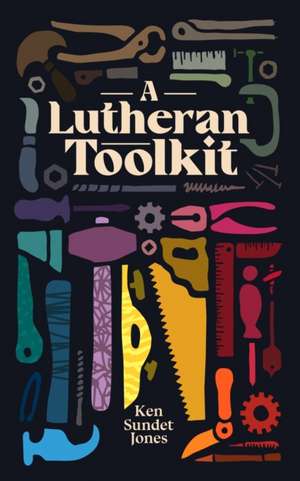A Lutheran Toolkit
Autor Ken Sundet Jonesen Limba Engleză Paperback – 9 feb 2021
Starting with Philip Melanchthon's 1530 Augsburg Confession, which was drafted to defend the preaching and teaching of Luther and his colleagues, Ken Sundet Jones sees its primary themes as a set of tools that God uses to build faith in us. He takes the reader beyond scholarly analysis and historical explanations and uses his own experience as a college professor, parish pastor, and sinner looking for mercy, to discover God's handiwork in our lives.
Each chapter takes as its starting point one of the foundational ideas presented to the Holy Roman Emperor and representatives of the church, including Sin , God hidden and revealed, justification, ministry, the Christian life, the church, sacraments, and vocation. These are not simply theological categories for scholars to debate or historians to recount. They're the lived experience of the faithful from the first believers, to big thinkers like Augustine and Luther, to people in the pews, at the supper table, in their careers, and at their deathbeds throughout the ages.
The tools in this kit continually point to Jesus as the one who promises mercy and abundant life - and who has the power to deliver them. This is a word for those who've not yet heard it and for those who desperately need to hear it again.
Preț: 55.68 lei
Nou
Puncte Express: 84
Preț estimativ în valută:
10.65€ • 11.18$ • 8.87£
10.65€ • 11.18$ • 8.87£
Carte disponibilă
Livrare economică 11-25 martie
Preluare comenzi: 021 569.72.76
Specificații
ISBN-13: 9781948969444
ISBN-10: 1948969440
Pagini: 98
Dimensiuni: 127 x 203 x 6 mm
Greutate: 0.11 kg
Editura: 1517 Publishing
ISBN-10: 1948969440
Pagini: 98
Dimensiuni: 127 x 203 x 6 mm
Greutate: 0.11 kg
Editura: 1517 Publishing
Notă biografică
Frequent contributor to 1517, Ken Sundet Jones is Professor of Theology and Philosophy at Grand View University in Des Moines, Iowa. He holds a PhD in Reformation history and Luther studies. Ken is steeped in both Luther's writings and today's popular culture, and he cherishes making 16th century ideas accessible to undergraduate students and lay people.
